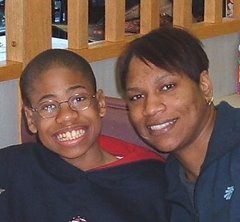Promise of lowering costs for treating autism
Case Western Reserve University study
http://www.medicalnewstoday.com/medicalnews.php?newsid=22709
Parents of autistic children can spend as much as $50,000 a year on therapies for their children. But a new research study from Case Western Reserve University's Mandel School of Applied Social Sciences shows promise of providing effective treatment for autism and other developmental disorders at a far lower cost.
Gerald Mahoney, the Verna Houck Motto Professor for Families and Communities and co-director of the Center on Intervention for Children and Families at the Mandel School, and Frida Perales, a research associate, conducted a year-long study of the effectiveness of "responsive teaching" strategies for parents to help their autistic children develop and use pivotal developmental behaviors.
Responsive teaching strategies promote parent interactions with their children through strategies such as "follow the child's lead" and "take one turn and wait." The results of their study appear in an article in the April 2005 issue of Developmental and Behavioral Pediatrics.
Mahoney and Perales compared the effects of the responsive teaching strategies on 50 children and their mothers, divided into two groups: children with pervasive developmental disorders, or PDDs (primarily autism), and children with other types of developmental disorders. The researchers investigated how these responsive teaching strategies helped parents' interaction with their children and improved children's development.
The study found that the responsive teaching strategies improved parents' responsiveness with their children, and were highly effective at enhancing children's developmental growth. Both groups of children made an overall 60 percent increase in their rate of cognitive development and a 150 percent increase in their rate of language development. The technique was also effective at reducing the social/emotional problems of the children with PDDs. "Although many professionals have speculated that interventions that encourage parents to become more responsive can be effective at promoting children's socioemotional well-being, this is the first long-term intervention study to actually demonstrate this effect," the authors write.
Equally important, the improvements occurred with an average of just 32 sessions with early intervention specialists, a relatively modest level of contact. The annual average costs for such interventions are about $5,000, a fraction of the annual costs of most existing interventions for children with PDDs.
The results also challenge the idea that only highly structured interventions can help children with PDDs, say the authors, since the less-structured procedures, which have aided the cognitive and language development of children with developmental disabilities, address those same needs in children with PDDs.
About Case Western Reserve University
Case is among the nation's leading research institutions. Founded in 1826 and shaped by the unique merger of the Case Institute of Technology and Western Reserve University, Case is distinguished by its strengths in education, research, service, and experiential learning. Located in Cleveland, Case offers nationally recognized programs in the Arts and Sciences, Dental Medicine, Engineering, Law, Management, Medicine, Nursing, and Social Sciences.
Contact: Jeffrey Bendix
jeffrey.bendix@case.edu
216-368-6070
Case Western Reserve University
http://www.cwru.edu/
For more information and resources on autism, go to: http://www.autismconcepts.com/.
Forget what you haven't heard… Family site shares news, resources, announcements and free or low-cost ways to help us manage day-to-day living with autism.
Crystal Brown

About Me

- Crystal
- AutismConcepts.com and Child-Autism-Parent-Cafe.com share a large collection of useful autism information, resources, and how-to articles written by authors who are touched by autism, offering practical solutions to families. Particularly minority and underserved families and caregivers who may not know what to do or where to go for help.
MJ And Me

Blog Archive
-
▼
2005
(194)
-
▼
April
(12)
- Experimental Drug for GI Dysfunction in Autism
- Study: Too Poor to Get Sick? The Implications of P...
- Study: Comparison of Blood & Brain Mercury Levels ...
- New report suggests that mercury-laced preservativ...
- Study Says Ethylmercury [Thimerosal] is Most Toxic...
- Study: Promise of lowering costs for treating autism
- NYS: Free Legal Resource Website for NYS
- Report to Congress on Autism
- Study: Psychological reasoning begins earlier than...
- Help Your Child Learn to Play Piano - Free!
- Playing Politics At Kids' Expense
- ADAPT Community Statement re: Terry Schiavo
-
▼
April
(12)